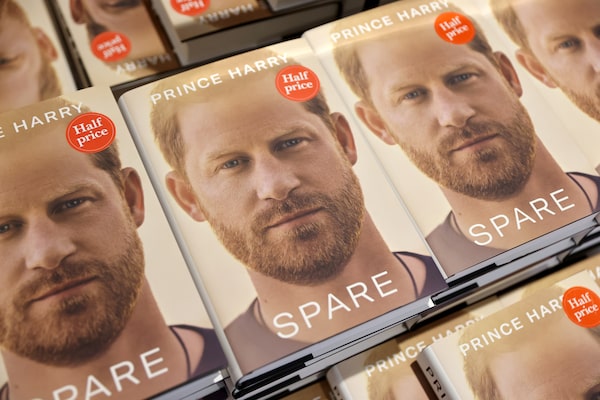
Copies of Prince Harry's new book Spare at a shop in London, on Jan. 10.Chris Jackson/Getty Images
Phoebe Maltz Bovy is a contributing columnist for The Globe and Mail.
Some – and I’m among them – argue that rather than being a way to promote social justice, so-called wokeness is about maintaining the status quo. A system of rules and manners that might seem progressive is in fact a cover for material inequality.
One could not design a better example of this than Prince Harry, the world’s premier nepotism baby. In his new memoir, Spare, Harry (he abhors snobbery, so let’s drop the “Prince”), bolstered by therapy, offers himself up as a courageous opponent of stiff-upper-lip upscale Britishness. He’s a modern man, in touch with his feelings. And he’s had it with archaic royal protocol, especially the bit about giving the kingdom to the elder son. Fight the power!
The biggest bombshells coming out of Prince Harry’s memoir, Spare
What Spare seeks to accomplish is to translate the life experience of a Prince who has spent much of his life carousing – a man whose life makes everyday white male privilege seem paltry – into the story of a victim of systemic forces.
When he partied, this was not a prince cavorting. It was a troubled young man finding solace in the bottle, the Ziploc bag.
Apart from the self-medicating, pre-rift Harry was known for having worn a Nazi uniform to a 2005 costume party. Ordinary people have been cancelled for less. But a royal, even a “spare,” is uncancellable. We learn that Prince Charles summoned the Chief Rabbi of Britain, who told Harry – 20 at the time – what the Holocaust was.
Harry recounts this episode in his usual feelings-speak. The takeaway is not about mankind’s evil depths, but rather about … his own “self-loathing.” And anyway, how contrite did he need to be, given that, in his telling, William and Kate put him up to it?
Indeed, much of the book covers how Harry feels, temperature-wise, while in the army but also in civilian situations. He’s forever either too warm or too cold. (The latter involves a nauseating anecdote about frostbitten nether regions. Harry’s no Gary Shteyngart, and should have left well enough alone.)
He complains that he finds the dining room at Sandringham House “subtropical,” but that the Queen’s corgis objected to open windows (the draft, you see) so footmen would audibly close them. “That loud thump, unavoidable because the windows were so old, always felt like the door of a jail cell being slammed.”
Royalty, for Harry, has been a prison. It’s involved being hounded by paparazzi, and it made his pre-Meghan romantic life a challenge: women were either put off by the lack of privacy, or a little too excited about becoming a princess. That being a royal has also afforded him endless second chances and unfathomable gobs of money eludes him.
The point is not that Harry hasn’t suffered. To lose your mother at 12 is tragic even if you’re a prince. Where things get murky is in Harry’s interpretation of more recent history. Do the grumblings of a second-born royal hold a place in any broader fight for justice? With the exception of the ones specifically about the British tabloid press’s racism against his wife, it’s hard to make that leap. Yes, he moved to California after falling out with his family. But is he right to say he “fled”?
The power that comes with being Prince Harry is his for life, whatever his official role within the Royal Family. Harry claims his father left him “unemployable.” But he can still do whatever he feels like (such as get a memoir ghostwritten by a fine writer), put a giant “Prince Harry” stamp on it and sell it to rapturous audiences.
The narrative at this point weaves from spring 2020 up to fall 2022. COVID – and the world shutting down – goes unmentioned, except as it affects their travel. A reference to Meghan’s three-bedroom detached property in Toronto as her “little house” offers a subtle reminder of Harry’s perspective. The book is at its strongest when Harry leans into that highly unusual vantage point.
Between the lines, and despite itself, Spare can be a fun, escapist and gossipy read, about a world where homes have 50 bedrooms and young people go on safari with hippos because why not. There’s the thrill of hearing the late Queen Elizabeth referred to as “Granny.” A royal story is worth more than a regular one, a fact that ultimately unites Harry with the tabloid journalists he – understandably – loathes.
On the streetcar home, gripping my copy of Spare, two older women sitting near me discussed the price of cauliflower. Nine dollars. More than these ladies could, uh, spare.